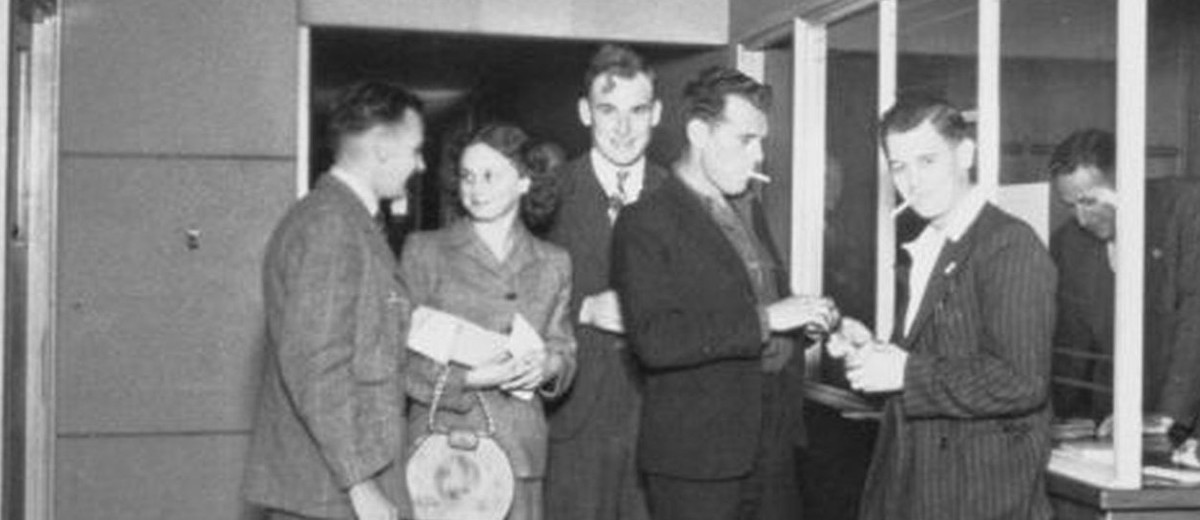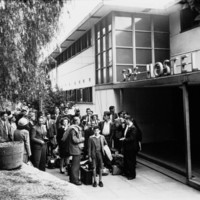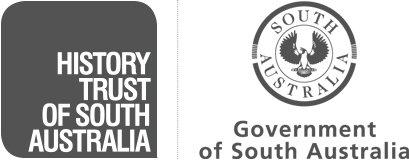In the five decades following the Second World War tens of thousands of 'new arrivals' were accommodated in migrant hostels across South Australia. The hostel at Elder Park was one of at least twelve government run hostels operating as temporary accommodation for migrants. There were many more sites run by government departments, industry and businesses as worker accommodation. The Elder Park migrant hostel was the first to open in South Australia, and the most centrally located.
In 1947 the buildings formerly known as the SPF Hostel (Schools Patriotic Fund Hostel) were converted into a migrant hostel. It was officially renamed the Immigration and Reception Depot, Elder Park in August 1948. Rooms varied in size from single cubicles to fourteen-bed dormitories. Residents could hear their neighbours through flimsy partitions. There were communal bathrooms, a dining room where residents collected their meals and ate six to a table, and a communal laundry with two ironing rooms. Some former residents have happy memories of spending time in the evenings with other new arrivals in the lounge and writing room. The rent at Elder Park varied, and was adjusted to take into account changes in cost of living.
Elder Park was set up for British migrants, though it is possible that Displaced Persons were accommodated there at some point. After 1951 it was also used by migrant railway employees and their families, along with dependents of army personnel recruited in the UK. The hostel was capable of housing between 160 and 180 people.
Elder Park hostel was overwhelmingly for short-term stay in transit to other hostels or pre-arranged independent accommodation. There are reports of people staying for several weeks, but the vast majority of people stayed only a few nights, sometimes only one. Many of the British migrants using Elder Park had opted into house purchasing schemes prior to arrival.

A visitor has told us she was part of one of the first 7 families placed at (what became known as) Elder Park Hostel, in Aug 1947:
No Jobs, No Homes -- Families at Hostel (1947, August 22). News (Adelaide, SA : 1923 - 1954), p. 3. Retrieved August 27, 2018, from http://nla.gov.au/nla.news-article127063607
The Advertiser, 3 June 1947 , '1,198 migrants for SA approved', p. 2
The Advertiser, 16 July 1948, 'At Migrants' Hostel', p. 7
The Advertiser, 4 May 1948, '326 British Migrants for SA', p. 2
The Advertiser, 20 Jan 1949, 'All-Migrant Ship Arrives', p. 2
The Advertiser, 11 June 1949, 'Skilled UK Migrants', p. 4
The Advertiser, 10 December 1949, 'Official says few U.K. migrants return from S.A.', p. 2
The Advertiser, 28 Dec 1949, 'Migrants Have Best Christmas For Years', p. 2
The Advertiser, Adelaide, 7 September 1954, 'Clive, 9, is still 'in the wars'', p. 1
Dr Karen Agutter, research notes, Hostel Stories project, the University of Adelaide
Migration Museum, Hostel Stories: Migrant Lives, Elder Park information sheet
Migration Museum, research files, Elder Park, Hostel Stories
National Archives of Australia, D400; SA1964/105222, Migrant Accommodation State Reception Depots Elder Park, Adelaide.
National Archives of Australia, B5661, 1948/669, Butter ration to British migrants temporarily accommodated, Elder Park, SA.
State Library of South Australia, OH 948, Hostel Stories Oral History Project, JD Somerville Oral History Collection, 2010 - 2017
State Records of South Australia: GRG7, 128, Capacity of State Migration Hostels.




Add your comment